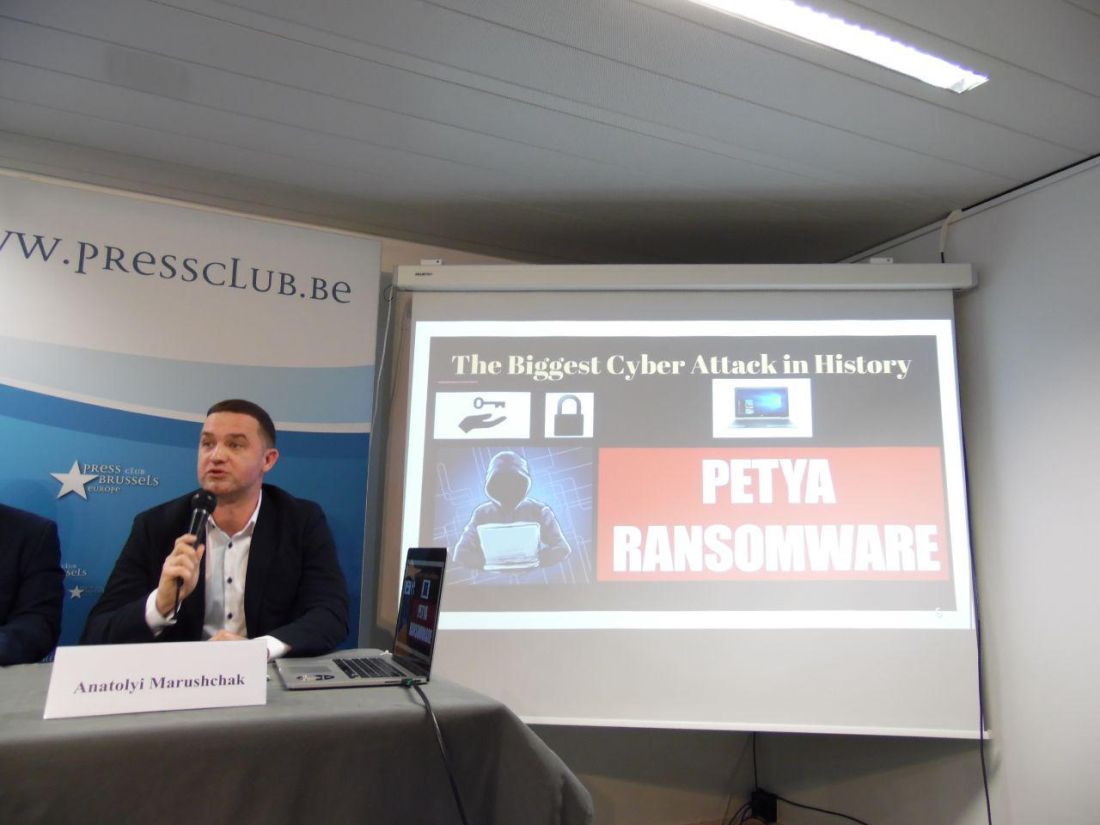
EU urged to help #Ukraine counter Russia disinformation campaign
The EU supported by the international community has been urged to help Ukraine counter an ongoing “disinformation campaign” being waged by Russia.
The appeal comes with concern about the impact of Russian “cyber and hybrid warfare” against the Ukrainian population, particularly in the eastern part of the country where war has claimed the lives of more than 15,000 people.
Speaking in Brussels on Wednesday (10 April), Professor Dr. Anatolyi Marushchak, of the International Information Academy (IIA), also warned that “lessons” of Ukraine’s experience can be learned for the upcoming European elections from 23-26 May, adding, “This is not just about Ukraine but about defending democracy around the world.”
He was one of the keynote speakers at a conference, at the Brussels Press Club, on the Ukrainian Experience in CyberSecurity conference, organized by the IIA, the Ukrainian Academy of Cybersecurity and the Taras Shevchenko National University of Kyiv, Ukraine in conjunction with the EU Ukraine Business Council.
Marashchuk said the IIA was set up to combat a concerted and aggressive “fake news” and “misinformation” campaign orchestrated by Russia which, he added, started soon after the annexation of Crimea back in 2014.
The psychological impact on many Ukrainians, not least in Crimea and also the Dombass region, had been “unbelievable” with the aim being “to spread lies about a revolution in the country.”
It was conducted, he said, with the support of a controlled, Russian-language media and via “internet trolls”.
Marushchak’s own family experienced the impact after the Ukraine bank where his wife worked was hit by a cyber attack which, along with other similar incidents, had resulted in “serious” economic and financial cost.
Another example he cited was a serious cyber attack in 2015 which had caused a major power outage in parts of the country.
In 2018 alone, some 35 cyber attacks were recorded in Ukraine, mostly involving the Russian state, including one targeting the UEFA Champions League final in Kiev.
The United States and Britain joined Ukraine in blaming Russia for the NotPetya campaign in 2017 which took a costly toll on the quarterly results of major global corporations including Cadbury chocolate maker Mondelez International Inc and freight logistics company FedEx Corp.
More recently, Russia’s hybrid warfare campaign against Ukraine was being fought in other ways, for example in “supporting local unrest” and on the diplomatic front, but the aim was the same: to destabilize and undermine the country.
He said: “Everything we’re seeing, everything we’ve intercepted in this period: 99 percent of the traces come from Russia.” You can only conclude that Russia has been trying to persuade our people that the path they have chosen is the wrong one.”
However, such attacks, he said, had accelerated the adoption of domestic legislation designed to counter such “destabilising” efforts. They had also led to the emergence of NGOs such as his own and fact-checking organisations whose aim was to help Ukrainians “distinguish between fake news and real news”.
Ukraine is better prepared to withstand such attacks thanks to cooperation with foreign allies including the United States, Britain and NATO but there are some Ukrainian companies that are still vulnerable to such attacks.
Looking to the future, he said it was vital that the wider international community, including the EU, continued to help counter Russia’s “cyber aggression”. He said: “They have to ask how they would feel if it was a member state of the EU that was subject to such things and how they would react to such attacks on their infrastructure.”
The aim, he suggested, was to use Ukraine’s experience and to enhance co-operation in combating fake news, misinformation and cyberattacks, both against Ukraine and other countries.
Another speaker, Elnur Ametov, a close aide to a top Ukraine MP, suggested thatRussian government-affiliated actors launched coordinated cyber attacks against Ukrainian government and military targets before and during the attack and seizure of Ukrainian ships and sailors in the Azov Sea on November 25.
He said that Russia had totally “scorched the media scene” in Crimea and, as a result, it was now hard to distinguish between fake and real news.
The outcome, he argued, had been to shift international attention from the continuing “illegal occupation” of Crimea.
“Russia has conducted a massive propaganda campaign in Crimea and people there now depend on the internet or social media for their news.”
This had, he noted, resulted in the emergence of “citizen journalists”, ordinary members of the public who live-stream incidents of “unlawful raids and arrests” by the Russian authorities.
He, too, said the EU and others had a role to play in countering such problems, saying, “everyone has an interest in this because what is happening in Crimea and Ukraine affects not just these areas but the stability of the whole world legal order.”













